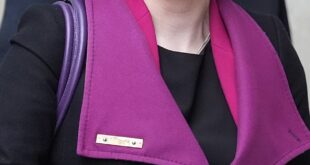FT subscribers can click here to receive FirstFT every day by email.
The Federal Reserve cut interest rates on Wednesday by 25 basis points, to a range of 1.75-2 per cent. But it signalled that easing could end there despite uncertainty over trade and fierce pressure from the White House for further accommodation.
The one-notch cut met investors’ expectations but the deeply split central bank committee put off questions about whether it needed to expand its balance sheet to prevent further disruption in the money markets. Our live blog followed the announcement.
The statement drew an immediate response from Donald Trump, who tweeted: “Jay Powell and the Federal Reserve Fail Again. No ‘guts’.”
US stocks dropped on the announcement before clawing back much of their losses. Asian markets rose on Thursday as did the yields on US government debt. The Fed’s triangulated response set the bar higher for additional easing, writes Michael Mackenzie in his Market Forces newsletter (sign up here).
Meanwhile, the Federal Reserve Bank of New York will inject a further $75bn on Thursday, its third intervention to reset the repo rate this week, after dealers submitted requests for over $80bn in overnight borrowing. (FT)
In the news
Pompeo calls Saudi attack an ‘act of war’
Mike Pompeo accused Iran of committing an “act of war” by attacking Saudi Arabian oil facilities, as the Trump administration prepared to impose “substantially” tougher sanctions on Tehran. The attack raised questions about Riyadh’s flawed strategy in Yemen. (FT)

Netanyahu’s uncertain future
Benjamin Netanyahu, Israel’s prime minister, has acknowledged for the first time publicly that he will be unable to form the rightwing coalition he promised voters after the general election left the country’s parties deadlocked. But it is too early to write-off the Likud leader, who faces a fight for his political life, says David Gardner. (FT)
Microsoft president foresees tech clampdown
Brad Smith, Microsoft’s president, told the FT that Big Tech would face broad regulation that went well beyond the narrow antitrust focus of recent decades. Microsoft shares rose after the company announced a $40bn buyback and dividend boost. (FT)
KPMG to slash hundreds of staff
KPMG UK plans to make about a third of its 630 administrative assistants redundant in a wave of cost-cutting. The restructuring means some partners, who are being encouraged to file their own expenses, will no longer have access to a personal assistant. (FT)
Cisco boss dismisses ‘tech cold war’
Chuck Robbins, the chief executive of Cisco, rejected fears of a breakdown in technology supply chains despite pressure on US companies to cut ties with China, suggesting that both governments “understand the future economic value of not balkanising digital infrastructure”. US senators also launched a bill to block the US government buying drones from China. (FT)
Trump picks hostage envoy to replace Bolton
Donald Trump has named Robert O’Brien, the envoy for hostage affairs at the state department, as his national security adviser, following John Bolton’s exit from the White House this month. Here’s a video profile of the former Bush administration official. (FT)

Dovish Bank of England
The Bank of England struck a dovish tone on Thursday after saying for the first time there was “entrenched uncertainty” over Brexit. Longstanding commitments to “gradual” and “limited” interest rate rises in the event of a smooth Brexit were replaced by a suggestion the UK central bank was beginning to worry it might have to cut rates to prevent inflation from falling too far below its target. (FT)
London lags New York
London has slipped further behind New York in a ranking of the world’s financial centres. New York seized the top spot from London last year, ending the UK capital’s five-year stint as the world’s premier financial capital, according to the twice-yearly global financial centres index compiled by consultancy Z/Yen. Paris and China’s financial centres are on track to overtake London within the next two years. (FT)
Trudeau forced to apologise
Canadian prime minister Justin Trudeau was forced to apologise on Wednesday for wearing brownface make-up to an Arabian Nights-themed gala he attended when he worked as a teacher in 2001. The controversy comes just a month before the country’s federal election, with the prime minister’s Liberal party slightly ahead in the polls. (FT)

Sign-up to Moral Money
This week’s Moral Money takes an inside look at the local costs of climate change, why “green quantitative easing” is irking France’s central bank governor, and the investors targeting US lobbying associations. Sign-up here
The day ahead
US-China trade talks resume
Deputy trade negotiators for the United States and China are expected to meet in Washington today. The discussions are aimed at paving the way for expected high-level negotiations in early October that would seek a way out of a bitter 14-month trade war between the world’s two largest economies. (CNBC)
More central banks meet
There will also be renewed pressure on the Swiss National Bank to cut rates — already the world’s lowest — when it meets on Thursday. Earlier, Japan’s central bank held monetary policy but hinted at action in October. (FT)
What else we’re reading
Why prescription drugs cost so much more in America
The high price of drugs in the US — and increasing contributions for insured patients — means drugmakers’ decisions have a big impact on Americans’ lives. It is also becoming an electoral issue ahead of the 2020 poll: 62 per cent of voters say healthcare is the most or the second-most important factor for America’s future. (FT)

Netflix: how will the story end?
After subscriptions fell in the US in the second quarter for the first time since 2011, the streaming company is beginning to look vulnerable — and it faces greater competition from Apple and others this year. Is Netflix’s business model sustainable? (FT)
Chinese misinformation
An analysis of China’s efforts to discredit Hong Kong protests reveals a sprawling disinformation campaign, which included more than 200,000 Twitter accounts, but was less sophisticated than Russian equivalents. Watch FT Asia Markets correspondent Hudson Lockett explain why Hong Kong still matters to corporate China. (NYT, FT)
Boris Johnson’s chicanery
The UK prime minister is no stranger to mendacity. But has he been lying to Her Majesty? Such is the dark morass into which Mr Johnson’s government has fallen in pursuit of the Brexit deadline, Philip Stephens writes. Britain has enjoyed centuries of relative stability — which may have created a country careless about risk, Simon Kuper writes. (FT)

Going boss-less
Hierarchies define businesses from family-run outfits to multinationals, and enable control and co-ordination. They also have drawbacks and may even be bad for our health. But experiments with giving workers greater autonomy raise other problems — such as how to avoid chaos and indecision. (FT)
Car seat maker’s conundrum
Britax, one of America’s best-known child car seat brands, has fallen into a bizarre and ironic trap when it comes to Donald Trump’s trade war with Beijing. The company, which employs 300 in a factory near the North Carolina-South Carolina border, has been battered by trade tariffs and is now being penalised by an exemption for some its competitors who import their products from China. As a result it is agonising about shutting down its US operations and possibly moving them to — China. Meanwhile, Edward Luce writes that Mr Trump is serious about the US’s divorce from China. (FT)
New approaches to dementia
Negative trial results have branded dementia an R&D “disaster zone”, but the pharmaceutical industry and academics hope the lessons will drive the fight against the disease. Britain is losing thousands of skilled workers because employers do not know how to cope with early-onset dementia. Read more in our Special Report FT Health: Business and Dementia . (FT)
Heels to flats
Entrepreneur Haley Pavone is taking the pain out of fashion: the founder of Pashion footwear produced a pair of shoes that can switch from heels to flats, allowing you to take the heel off, but keep the shoe on. (FT)

Sign-up to Tech Scroll Asia
A SoftBank-cool wind is blowing through Asia’s tech start-up universe, the latest sign of the widening fallout of the ill-fated WeWork IPO. Read more about the sterner emphasis on profitability that is zipping through the region as a result in this week’s Tech Scroll Asia newsletter. Sign up here.
Video of the day
Considering climate change
Ahead of strikes started by climate activist Greta Thunberg, the FT and The Royal Court collaborate to explore inaction on climate change with the help of actress Nicola Walker, who asks why we “never really learnt how to talk about this”. (FT)
Source link



